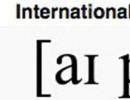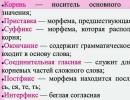M Spivak Harry Potter. Biography and personal life of the Russian translator Maria Spivak. Because of this, you are not afraid to leave the house
A few days ago, among the inhabitants of Runet, who are interested in literature, a small “bomb” exploded when a group of enthusiasts began to collect signatures against translations of the Pottery by Maria Spivak. Watching this storm from the side, I wanted to put in my five cents.
Please note that the following is purely personal opinion. Not the position of the magazine "World of Science Fiction", not the view of the editor of the book section of this magazine. And just the opinion of a fantasy fan with a very solid reading experience.
First, a little history. When Rosman just started publishing Rowling's books in Russia, the cycle was already an international bestseller, but the total world madness around it was just beginning. Only echoes reached us, because, it seems, the publishing house was afraid that the series "would not work." Otherwise, it is impossible to explain why the best forces were not involved in the translation of a potential mega-hit. After all, there are really outstanding translators from English in Russia, on whose account there are many brilliant works. Likhachev, for example, or Dobrokhotov-Maikov. There are many others. But it is clear that the work of a high-class translator costs money. And for the translation of "a pig in a poke" it simply does not make sense to involve such a person. Probably, the Potter books were considered just such a "cat", because teenage fantasy in those days was not quoted in our country. Suffice it to say that the first print run of the book was a modest 30,000 for such a hit. It was then that there were already reprints - almost half a million, not to mention numerous reprints.
In general, "Rosman" in some "left" way attracted Igor Oransky, a sports journalist who at the same time dabbled in translating fantastic stories, to work on the "Philosopher's Stone". Oransky himself noted that Rowling remained absolutely indifferent to the text. As a result, the book was simply not interesting to read. All the hype around the novel and the cycle in the West was completely incomprehensible. Are they crazy there? Why on earth did this dull and naive garbage become a world bestseller?
These books were the first introduction to Harry Potter.
The existing Potter fan base (after all, many people read English in our country) literally exploded! Oh, what storms raged on the Web! With a strong desire (after all, the Internet remembers almost everything), you can delve into these ancient records of 2000 and enjoy ... The translation of Oransky was simply crucified, and although a number of errors were corrected in further editions, the "black mark" was firmly entrenched in this work. The funny thing is that even this controversial version was a solid success, although the hysteria around the world probably contributed to the hype around the Potter.
And against this background, "folk translations" began to appear on the Web - both the first and other volumes already published in the West. They were terrible - the actual interlineators that were edited by all and sundry. And one of these self-propelled guns was the translation of Masha Spivak, which stood out from the rest like a diamond among the cobblestones.
Moreover, the Pottery from Spivak (and she gradually began to translate other books as well) among fans was quoted much higher than the official versions from Rosman! Although, starting from the second volume, the publishing house attracted solid forces. The Chamber of Secrets, The Prisoner of Azkaban, and partly The Goblet of Fire were translated by eminent professional philologist Marina Litvinova. And a whole brilliant team took part in the work on subsequent books, among which were such stars of Russian literary translation as Viktor Golyshev, Vladimir Babkov, Leonid Motylev, Sergey Ilyin, Maya Lakhuti. Although blunders met here. For example, the final novel of the series, The Deathly Hallows, turned out to be crumpled. For the sake of efficiency, the book was translated by three people at once - Ilyin, Lakhuti, Sokolskaya, which is why the novel turned out to be very heterogeneous stylistically. It is precisely for the sake of correcting such shortcomings that there is a literary editor, which, it seems, this publication simply did not have ...

"Harry Potter" from ROSMAN: "black series"
By that time, Spivak's translations were already actually banned, because officially they were considered pirated. The story of hunting them is another story! And as soon as the fans did not contrive, fighting the system, - “Um. Tasamaya" has become an actual meme...
And now, when the rights to the Pottery editions have changed hands, Makhaon and Azbuka-Atticus used Spivak's translations (of course, heavily edited in comparison with the network versions). While it was about the reprinting of books, which, apparently, were already in almost every home, this did not cause much fuss. However, with the advent of the new Potter book, the situation has changed. Everyone who is a fan of the Potter series will probably want to buy a new novel, but the vast majority are “covered” by the Rosman translation, and the Spivak version seems alien to them. So the hype is understandable.
I do not presume to judge the comparative advantages and disadvantages of the Rosman and the alphabetic versions in terms of facts, for example. Moreover, we will soon have a detailed article on this topic. I will only express my opinion as a person who has read both versions. Personally, I like Spivak's Potter a lot more, and here's why.

Spivak captures the spirit of the Potter series very clearly. Her translation is often reproached for being "childish", but, for mercy's sake, the cycle was written primarily for children! In the first novel, the hero is only eleven, with each book he grows up, which happens to his readers. And the approach chosen by Spivak is completely justified. Before us, first of all, are fascinating fairy tales “with meaning”, and with each new volume, fairy tales become less and less, and more and more meaningful. The Potter novels of Spivak's version are a sane synthesis of charming fabulousness, childish spontaneity, external fascination and quite serious semantic content. This is exactly what Rosman's translation lacks - the author's magic, without which there would not be such a crazy success of the series, it simply does not exist! The translation was done by serious people who worked professionally and responsibly. But no more than that...
Although the main miscalculation, perhaps, is precisely that the Rosman version was translated by as many as twelve people in total! The situation could be corrected by ONE literary editor, which would bring the mixed translation to a common denominator. Well, as did, for example, Alexander Zhikarentsev, who at one time supervised Terry Pratchett's translations at Eksmo - after all, many people worked there too, and not all translations were equally good. But alas.
Spivak's translations are much more complete in this sense. From the first to the last word of the series, the translation was carried out by one person, who, moreover, was sincerely passionate about the original and worked with all his heart. And this is also important ... It is the "soulfulness" that attracts in the version from Spivak - Rowling's text lives and plays, breathes and shines. You read it with pleasure, with joy, it is truly “delicious”, like a bag of colorful sweets from under the New Year tree… Against this background, Rosman’s version looks like a dense and satisfying lunch from the first, second, third. Nutritious, healthy - yes, maybe. Only, alas, not fun.

Machaon released such a chic edition of Harry Potter
Perhaps the main drawback of Spivak's version, which became a stumbling block, is the translation of proper names and a number of titles. Here, perhaps, we can partly agree with the dissatisfied. If in the initial, most carefree and fabulous volumes of the cycle, “speaking” names still looked, albeit exotic, but more or less appropriate, then in darker books their frank childishness looks simply ridiculous. Zloteus Zlei, brrr... On the other hand, in Rosman's translations there are also such pearls that you will rock - Dolgobotups, for example. Perhaps it would be more appropriate not to translate the names at all, limiting themselves to footnotes or a detailed glossary. But what's done is done - in both cases.
However, if we discard names and terms (all the more so since many of them quite successfully reflect the essence of characters, names and objects), the rest of Spivak's claims to translations simply crumble to dust.
Moreover, I am one hundred percent sure: if Rosman had released the Potterian from the very beginning in Spivak’s translation, then all those who are now shouting “Atu!” to them with foam at the mouth, would have defended them with the same ardor and heat. . Because the question is not about the real quality of translations. Birthright and a matter of habit - that's the secret. The vast majority of Potter readers got acquainted with the books in the Rosman translation - and simply got used to it. Even if it is a million times worse than Spivak's translations, first love does not rust ...
But for those who are just getting acquainted with Rowling's books, I wholeheartedly advise: read it yourself and give your children this cycle precisely “from Spivak”. Get much more sincere pleasure! And the rest will have to accept or follow the beaten path of the “zero” fans, creating sites with a “folk translation” of the eighth volume of the series ...
On July 20, 2018, the 55-year-old writer and translator of books about the sorcerer Harry Potter, Maria Viktorovna Spivak, died. The head of one of the publishing houses, Alla Steinman, announced her death. Information about the death of a talented Russian writer was confirmed by Olga Varshaver and her other colleagues.
The biography and personal life of Maria Spivak, after the translation of books about the sorcerer, began to interest the press. The author's translation caused incredible criticism from the citizens of Russia and fans of Harry Potter. Fans of the sorcerer boy even created a petition in which the demand was announced for the removal of the Russian woman from the translation of the original text. More than 70,000 people voted to remove Harry Potter and the Cursed Child from translation. Now the media is discussing the death of Spivak and the date of the farewell ceremony.
Biography and personal life of the scandalous translator Maria Spivak
Maria Viktorovna became popular thanks to the successful 10 translations of JK Rowling's books. More than 20 texts by other authors were also translated into Russian. In addition to making translations, the Russian woman wrote her own novels. The most famous were The Year of the Black Moon and the English book The World Elsewhere. Nine years ago, Spivak received the Unicorn and Lion award. This award was given to the best translation of Irish and British texts.
The writer decided to decide to translate the original of the famous books about the sorcerer at the beginning of the 2000s. The first 4 books about the wizard were translated by Maria Viktorovna within two years, and they were published on the Harry Potter website. Critics ambiguously assessed the work of the Russian translator. Nevertheless, Spivak ended up on the long list of the Small Booker Award. At the end of 2002, Maria received a letter from the copyright holders, after which she was not allowed to translate the literature of foreign authors under her initials.
A decade later, employees of the Azbuka-Atticus publishing house contacted Spivak, who received the right to publish Joan Rowling's books in the Russian Federation. They offered to publish translations of a talented Russian woman for a good fee. Three years ago, the publisher published a translation of the original Harry Potter and the Deathly Hallows. Previously, the Russian translation of this literature did not get on the Internet.
Literary critics in an unpleasant shock from the translation of Spivak
After the text was on the network, Mary began to receive letters with threats and blackmail. She was told that her translations were far from the original source and had no right to exist. Also, fans of the sorcerer boy noted that Spivak changed many of the names in the books beyond recognition. Two years ago, one of the Russian publishing houses, despite the scandals around the person of Maria Viktorovna, decided to publish her translated literature "Harry Potter and the Cursed Child."
Fans of the sensational bestseller criticized Masha's work because of the nicknames of the main characters: "Dumbledore", "Dursley", "Professor Moonshine" and others. Also, readers of the translations of the 55-year-old Russian woman condemned Spivak for the haste in translation and the lack of any editing.
Vladimir Babakov, the translator of Rosmen, said that he would soon publish a normal translation of the book and distribute it via torrents. Not much is known about the personal life and biography of the translator. The date of the funeral is not yet known.
Maria Spivak is known to a wide range of readers for the controversial and heatedly discussed translation of the Harry Potter series of books, which is actively discussed on Internet forums to this day. And at the time of release, it literally divided fans of the cult fantasy novel into two camps.
What else can you remember about the life and work of the translator?
Biography of Maria Spivak
Maria Viktorovna Spivak was born in Moscow on October 26, 1962. Even as a child, she knew that she wanted to be a translator. I read a lot and learned English early. Fate decreed otherwise: Maria Spivak graduated from one of the technical universities and found a job in her engineering and mathematics specialty.
The crisis of the 90s helped to return to the path chosen in childhood. In 1998, the future writer loses her job and instead of looking for a new one, she decides to try her hand at translation.

The first translations of Maria Spivak were made exclusively for a narrow circle of acquaintances. According to the author, she turned to "Harry Potter" before the official version of the first book in Russian was published. Her translation has gained wide popularity on the Internet, with readers repeatedly requesting that chapters of the story about the boy who survived be continued to be published.
After the complete series of "Harry Potter" in Spivak's version was printed, the translator received a huge amount of critical feedback. Several times she received letters from aggressive fans of the work with insults and threats. According to close people, this was one of the reasons for the writer's early departure from life - she died of a serious illness at the age of 55.
A family
Translator Maria Spivak was born into an intelligent and prosperous family. Parents considered it important to give their daughter a good education. She studied German at a language school, and English on her own and in individual lessons, which was somewhat atypical in the USSR during her childhood, given the current political situation.
Family life
In 2009, the translator divorced her husband, which was not easy for her.
Creation
Spivak has ten translations of Rowling's books to her credit:
- "Harry Potter and the Philosopher's Stone";
- "Harry Potter And The Chamber of secrets";
- "Harry Potter and the prisoner of Azkaban";
- "Harry Potter and the Goblet of Fire";
- "Harry Potter and the Order of the Phoenix";
- "Harry Potter and the Half-Blood Prince";
- "Harry Potter and the Deathly Hallows";
- "Fantastic Beasts and Their Habitats";
- "Quidditch from antiquity to the present day";
- "Harry Potter and the Cursed Child"
And more than 20 translations of other works by British authors.
Maria Spivak was awarded the "Unicorn and Lion" award.

Fame
Some time after the appearance on the Internet of Maria Spivak's translation of the book "Harry Potter and the Philosopher's Stone", the owners of the rights to the text contacted the woman, banning the publication. However, fans reacted instantly by posting the work on another site and under a different name. This is how the comic pseudonym of Maria Spivak appeared - Em.Tasamaya.
Ten years later, when the publishing house "Rosmen" transferred the rights to publish the saga to "Makhaon", Spivak was approached with an offer to purchase her translations for a decent fee.
Probably, Spivak could not even imagine how much controversy would unfold around her work.

Criticism
The translation, which was initially popular on the Web, expected a flurry of criticism after reading it to a huge audience of fans of the book.
It is worth noting that fans have always had a lot of complaints about the translation of M. D. Litvinova, published by Rosman, the main of which is the insufficiently well-translated style and style of J. K. Rolling.
In the work of Maria Spivak, the greatest dissatisfaction among readers was caused by the translation of proper names.
According to the rules, names and titles should be left unchanged as in the original or adapted if, from the point of view of the Russian language, they turn out to be dissonant. But even those names that Spivak did not translate into Russian do not sound exactly as required by the rules of reading.
For example, Dumbledore became Dumbledore, although the English letter "u" usually means exactly the sound "a", and there is no soft sign between two consonants in English. Mr and Mrs Dursley turned out to be the Dursleys (in the original Dursley).
The situation was even more complicated with those names that underwent translation. Much has been said about the comic effect that is created when "Oliver Tree" is replaced, and "Bathilda Bagshot" is replaced with "Bathilda Beetle".
Well, the proper names proposed by Maria Spivak, which are designed to characterize the character in a certain way and were chosen only in consonance with the original ones, remained completely unaccepted by the audience. So, a huge outrage was caused by the name of Severus Snape, who is called Villainous Snape. This name has very little to do with the English version and is not consistent with the character of the character, who does not personify evil at all, but is extremely controversial and ambiguous, moreover, a beloved hero.

The controversy flared up even more after an interview with a writer who says that her translations are of better quality than those published by Rosman. She emphasizes that translating a book is not just about adapting titles and urges readers to pay attention to the rest of the text.
However, readers have a lot of complaints about the style. First of all, many are annoyed by the frequent and usually inappropriate use of jargon. For example, Mr. Dursley calls the wizarding community a gop company, and Hagrid, in the presence of children, says that Filch is a "bastard".
Corrosive admirers of the Potteriana continue to find speech, grammatical, stylistic errors and translation inaccuracies in the books of the Makhaon publishing house.
Those who remember the first translations of Maria Spivak posted on the Web say that their quality was much better before the editorial changes were made (Makhaon's editor is A. Gryzunova). Spivak herself was very reserved in commenting on these changes, noting that they are inevitable in editing.
Even after the death of the translator, discussions continue. Fans find new advantages and disadvantages of Spivak's text, actively comparing it with Rosman's. One way or another, at present, Maria Spivak is the author of the only officially published translation of the famous saga.
On Friday, July 20, translator Maria Spivak, best known for translating books by JK Rowling, the author of the Harry Potter saga, died. Spivak's work was marked by literary awards, but she did not enjoy much love among Potter fans: they even created an online petition to remove Spivak from translating Rowling's books.
Director of the Russian book publishing house "Phantom Press" Alla Shteinman on Friday, July 20, announced the death of the translator of books about Harry Potter, Maria Spivak.
Alla Shteynman
Masha Spivak died today. My dear friend, I'm sorry I didn't save you. R.I.P.Details about the date of the funeral will be later.
Information about the death of Spivak was also confirmed by the translator Olga Varshaver.
Olga Varshaver
Masha Spivak died today.There are no details about the farewell yet, but Alla Shteynman will have it.
And I beg you not to arrange a debriefing of translation flights on such a day. This is completely inappropriate.
Blessed memory of Masha.
The remark about "debriefing" refers to the ambiguous reputation that Maria Spivak enjoyed with Russian-speaking fans of the work of the English writer JK Rowling.
Spivak was not a professional translator. She herself described her entry into the profession in an interview with PotterLand.
I am a mathematical engineer by training, and I became a translator magically - thanks to Harry Potter. Our destinies are similar: it was suddenly revealed to him that he was a sorcerer, and to me - that I was a translator. For me, retelling a foreign text in my own language - my own in every sense: my own and my own - and conveying all the nuances of this text is a real pleasure.
Maria met Harry Potter in the original language in 2000 and immediately decided to create her own, author's translation of Rowling's books into Russian. By that time, Spivak already had experience in literary translation - she retold Douglas Adams' cult novel The Hitchhiker's Guide to the Galaxy in Russian, and this translation was a success with her friends.
In her version, Spivak tried to translate proper names almost literally, which is how Professor Dumbledore, Neville Longbottom, and Slotheus Snape appeared. At the same time, Dumbler, Dolgobotups and Severus Snape appeared in the official translation from the Rosman publishing house.
From 2000 to 2002, Rowling's first four books about a boy with a scar on his forehead, translated by Maria Spivak, were published on the Harry Potter Research Institute website. However, after the intervention of the copyright holders, the translations were removed, and Spivak continued to work on the next two books in the series under the pseudonym Em. Tasamaya.
In 2013, the Rosmen publishing house ended its license to publish JK Rowling's works in Russian, and Machaon, a member of the Azbuka-Atticus group, began publishing books. The new publishers refused to cooperate with the translator Marina Litvinova and her colleagues who collaborated with Rosmen and turned to Spivak.
Later, the translator complained that some of the publisher's editors' decisions led readers to dislike her translations. Here is what she said in an interview with the Harry Potter Research Institute.
While my translation was only online, I received millions of enthusiastic letters. And when it was published, I began to receive not only numerous abusive reviews, but even more numerous threats to kill me.
To date, there have been eleven books published by JK Rowling translated by Maria Spivak, including Fantastic Beasts and Where to Find Them, Quidditch Through the Ages, and Tales of Beedle the Bard.
In 2017, when the Azbuka-Atticus publishing house announced the publication of a new book about Harry Potter, which is a printed version of the script for the play Harry Potter and the Cursed Child, opponents of Spivak's translations created
About Harry Potter, which caused a mixed reaction from readers. This was announced by the director of the Phantom Press publishing house Alla Shteinman on her Facebook page.
“Masha Spivak died today. My dear friend, I'm sorry I didn't save you. R.I.P. Details about the date of the funeral will be later, ”Steinman said.
At the moment, the circumstances of the death of the translator are unknown.
In 2016, Maria Spivak worked on the translation of the last eighth part of the book series by the writer JK Rowling "Harry Potter and the Cursed Child. Parts one and two."
Then the translation caused a mixed reaction among fans of the saga. Fans demanded that the work on the text be entrusted to a person who "could avoid gag and free retelling."
The very news that Maria Spivak would be translating the book upset fans of the Potter universe. Most of them began their acquaintance with a series of books from the translation from the ROSMEN publishing house. However, in 2013 the publishing rights were transferred to the Makhaon publishing house, and since 2014 the saga has been published in an “alternative” translation from Spivak.
After the release of the book, excited users on social networks published fragments of the text in which they found numerous errors, and even created a petition against the release of the book with Maria Spivak's translation. One of them was signed by more than 60,000 people.
Most readers complained that Spivak, trying to adapt the language, literally translated the names and surnames of the characters and beat them in the form of a pun. So, Severus Snape turned into Zlotheus Snape, Luna turned into Psycho Lovegood, and Madame Trick turned into Madame Moonshine.
Such adaptations caused outrage among fans. In particular, readers noted that by the end of the saga, Snape's hero is revealed on the positive side, and Zloteus Zlei, translated from Spivak, sounds unambiguously negative.
Despite the dissatisfaction of the fans, the Makhaon publishing house refused to change the translator.
Maria Spivak in interview She admitted to the Gorky edition that she was not familiar with other translations of the Harry Potter books, and when working on the text, she started from the meaning inherent in the names, and "tried to convey the same in Russian."
“Severus Snape is a name that also sounds frankly harsh, although my version sounds, of course, harsher. However, the word “Zloteus” means both “evil” and “gold” at the same time, so the double subtext of the character of this character has not gone away,” the translator explained the origin of the name “Zloteus”.
Maria Spivak also reported that since the release of the first book, she had to face numerous threats from fans of the saga.
In addition to those who opposed the transfer from Spivak, there were those who supported her. So, the translator of the fifth book of Harry Potter declared that “the translator should be guided by the opinion of the public, but not be led by it”, emphasizing that the adaptation of names is the business of Spivak herself.
Maria Spivak is a Russian writer and translator. She gained the greatest popularity after the release of translations of the book series by JK Rowling "Harry Potter and the Cursed Child. Parts one and two." She is also the author of two novels, Year of the Black Moon and A World Elsewhere.
In 2009, Spivak was awarded second place in the Prose category for her translation of the British writer Nicholas Drayson's novel The Book of Birds of East Africa.
Premiere of Harry Potter and the Cursed Child. Parts One and Two” was held on July 30, 2016 in London at the Palace Theatre. The play was directed by John Tiffany. The Cursed Child begins immediately after the finale of the seventh installment in the series, Harry Potter and the Deathly Hallows.
Books Harry Potter and the Cursed Child. Parts One and Two” were released in English immediately after the premiere of the performance, on July 31. In Russia, the series went on sale on December 7, 2016.






